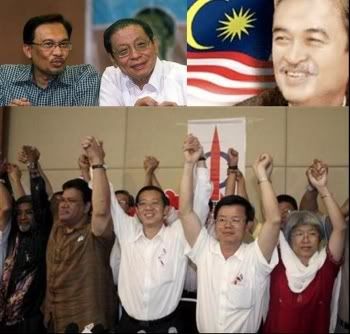Tuesday, March 09, 2010
Tuesday, September 30, 2008
"Toh I miss you, your friend Mark"
 This was a drawing done by Mark Malloy, a dear friend of Eddie in his Notre Dame days. Below is a summary of his email to me few months ago, explaining the drawing and photo taken then. Mark, thank you for your email and the potraits. I finally have the courage to post this.
This was a drawing done by Mark Malloy, a dear friend of Eddie in his Notre Dame days. Below is a summary of his email to me few months ago, explaining the drawing and photo taken then. Mark, thank you for your email and the potraits. I finally have the courage to post this. Toh's roommate at Notre Dame from 1987-1990 and his friend forever.
One is the original sketch that I did of Toh many years ago ( we were sitting in our dorm room and he was working on a paper or writing a letter home). The other is a self-portrait photograph that Toh took in 1987. This photo is really great and is well-remembered by his friends from Notre Dame. He gave me the photo as a parting gift when we left college.
While you are getting the originals in the mail, for the blog I have attached the two images below and if you have trouble with the attached files, you (or anyone) may find the images at my website--you can save them to your computer from there :http://www.gis.net/~malloyart/toh.html
 To tell you the truth I have not wanted to mail these things to you. As it turns out, mailing them confirms that he is gone and I just do not want that to be true. However, you are the one who should be comforted by them and not me. They have been on our family's mantle since April 1st.
To tell you the truth I have not wanted to mail these things to you. As it turns out, mailing them confirms that he is gone and I just do not want that to be true. However, you are the one who should be comforted by them and not me. They have been on our family's mantle since April 1st. I could not help focusing on the fact that the photo was the work of his hand. He made the print. He mounted it. He signed it: "Liberty, Toh Wei Chee, May 1, 1987"
About the drawing: I drew it in the now-embarrassingly generous time that we had in our room together. He was there in front of me and I could not have known how precious that time would be.
"Toh I miss you, your friend Mark"
Posted by
Sophie
at
12:35 AM
11
comments
![]()
Friday, May 23, 2008
Happy Anniversary, Darling....
'Can't Help Falling In Love' by Elvis Presley was played on air.
You chose to sing this very same song to me on our wedding day.
Happy anniversary, darling
Love Always,
Wifey
Posted by
Sophie
at
12:03 AM
14
comments
![]()
Monday, April 07, 2008
Till we meet again...
 Eddie Toh, the author of this blog, died suddenly on Sunday, March 30, 2008, just two days before what would have been his 41st birthday. His funeral took place on Thursday, April 3, 2008 at Singapore's Mandai crematorium. This is an extract of a tribute read to the service by his beloved wife Linda Goh.
Eddie Toh, the author of this blog, died suddenly on Sunday, March 30, 2008, just two days before what would have been his 41st birthday. His funeral took place on Thursday, April 3, 2008 at Singapore's Mandai crematorium. This is an extract of a tribute read to the service by his beloved wife Linda Goh.The first time I met Eddie was about 15 years ago. I was 18 and he was 27. He had come to check me out after his colleagues told him to take a look at who his secretary was having lunch with. I must say I was quite disappointed to learn that "this" irritating guy was Nina's boss.
He pretended to be disinterested. You know Eddie, always trying to be cool. Women did not affect him - or not that let he let on. It just as well, because I was seeing someone else at the time. In fact, I could have easily forgotten Eddie. But he would not let me. He would continue to make himself a nuisance by wise-cracking whenever our paths crossed. It would not occur to me until much later that he was actually interested in me.
Yes, first impressions can be misleading. Never could I have imagined that such a forgettable encounter would mark the start of an incredible journey with a man who was able to make me feel I was the most special woman in the world.
While I was pretending to watch the show, waiting for him to make his move, he was obviously plotting. First, he manoeuvred his hand around his lap until it was next to my thigh. Then he pressed that hand into my hand. And then he drew both our hands to his side.
Naturally, I gave not the slightest hint that I had noticed anything was going on. But inside, it was the most warm and wonderful feeling. It was the start of a beautiful life together - a life I wish with all my heart had gone on so much longer.
Honey, you meant everything to me. You gave me love, you gave me laughter. You tickled me, you taught me. You brought me joy, you made me cry. But when I cried you would end up crying with me. And with each tear that fell, we grew closer. Because that is what true love is: Accepting each other for the good and the bad, the highs and the lows, the perfect and the imperfect.
Didi, we had great times and some sad times. But before we knew it, we had become each other's second nature. Every day I would see you working at your computer, typing furiously as you made funny faces at me. Yes, you were always there. Supporting me and guiding me. Cuddling me with your arms - and your eyes. No one ever made me feel so comfortable. No one touched me more. No one ever could. I miss you so much….
Your friends tell me I was the best thing that happened to you. I refuse to believe this. Because let me tell you - and everyone - that you are the best thing that ever happened to me. Didi, you are my soul mate.
As I bid you farewell today, let me say again: Darling, this is not goodbye - not for me. I do not pretend to understand why you are continuing your journey alone. But I know you are in good hands, because I saw you coming close to the Lord in the final months of your life. I know He has guided you home. And when my time comes, I pray that I will have done enough to join you in heaven, so we can make up for all the time we did not share on earth. Knowing you, I know you would have made plans for me too.
As surely as love conquers all, you conquered my heart, Didi. I thank you for the past 15 years. I thank you for all you did for my family, for all you did for our friends. But most of all, my love, I thank you for all you did for me.
You did well, Didi. So rest well. You will always be a part of me and I will always love you.
Posted by
Sophie
at
2:51 PM
16
comments
![]()
Saturday, March 29, 2008
Did bloggers really create the Malaysian tsunami?
 This is a well-written commentary by a former journalist in Singapore's TODAY newspaper today. Cherian George looks at the role of the Internet and blogs during the watershed elections in Malaysia this month.
This is a well-written commentary by a former journalist in Singapore's TODAY newspaper today. Cherian George looks at the role of the Internet and blogs during the watershed elections in Malaysia this month.
It's a timely reminder that bloggers only play one part in the big scheme of things. Bloggers on both sides of the causeway will never replace mainstream media, despite general unhappiness with the two governments' mouthpieces on certain key issues.
But ultimately, editors and writers -- whether they are in the mainstream media or blogosphere -- must be credible. Both platforms also need to engage each other more frequently to give a more complete picture to people in Singapore and Malaysia.
Did bloggers really create the tsunami?
Cherian George
March 29, 2008
MALAYSIAN Prime Minister Abdullah Ahmad Badawi's admission this week that his government did not pay enough attention to the Internet is one of the sexiest explanations yet for its shock defeats in the recent elections.
Perhaps bloggers will now replace bomohs as the suspects of choice behind bizarre political phenomena like those witnessed on March 8.
Some of the hype around this admittedly magical technology is justified. By dramatically lowering the barriers to entry for wide communication and collaboration, the Internet is quite simply the most powerful platform for innovation — including political innovation — in the history of civilisation.
However, every sober analysis of its impact since the Internet's mid-1990s "big bang" has come to the same conclusion: The technology is not powerful in isolation; the World Wide Web weaves its wonders only in concert with other old-fashioned forces.
Thus, the vibrancy of Internet politics in Malaysia is very much a reflection of an offline environment of lively opposition politics and civil society activism. Mr Jeff Ooi — Malaysia's mr brown — could transition from blogger to victorious parliamentary candidate because the Democratic Action Party was well placed to harness his popularity.
Similarly, aliran.com was able to churn out influential reports because it is backed by the established Penang-based human rights non-governmental organisation, Aliran. Less savoury attributes of Malaysian cyberspace, such as its poison pen practices, are also rooted in the country's offline traditions.
Internet power should also be seen in the context of the wider media environment. While media companies are often wedded to one medium or another, most users are promiscuous by instinct.
They flit between media, each promising its own uses and gratifications — perhaps a newspaper for comprehensive news, television news for its pictures, a blog for personal insight, an activist's website for biting commentary, SMS for the latest gossip or joke, coffeeshop talk to share their own views, rally attendance for a sense of community, and so on.
If people suddenly gravitate towards one medium, it is often because another has failed to meet their expectations. This is certainly the case in Malaysia, where the crippling of the mainstream media by government control is the main reason why Malaysians have flocked online.
Even the editors of the leading independent site Malaysiakini humbly concede that their success isn't because they are so great — they are still resource-poor by news organisation standards — but because their mainstream rivals are found wanting.
Therefore, the government's fundamental mistake was not that it neglected cyberspace, as claimed by the Prime Minister, but that it failed to address offline problems — which were then exposed and exploited by Internet-empowered opponents.
Officials should have learnt from the Reformasi protests of almost a decade ago, when its mainstream media stranglehold resulted in media coverage out of sync with the public mood, with massive losses in newspaper circulation and a windfall for alternative websites such as Malaysiakini and Harakah Daily.
Now, officials are talking of courting independent bloggers or investing in their own. But this will not fix the real problem of inadequate respect for freedom of expression, resulting in a lack of credibility for all media linked to the state. Comparisons with Singapore — Malaysia's fraternal twin — are irresistible.
If even the Malaysian Prime Minister has acknowledged the political impact of the Internet, does that not make Singapore — with its far greater Internet penetration levels — ripe for its own electoral tsunami? Only if one imagines the Internet to be some kind of magical force, which it isn't.
Distilling more thoughtful analyses of the Malaysian elections, 2008 appears to mark a tipping point at which voters decided that poor governance was no longer tolerable. The ruling alliance — and practically everyone else — had expected racial loyalties and a controlled mass media to compensate for its failures and inefficiencies.
But a threshold appears to have been reached, indicating that ideological advantages are finite, while good governance is all. Like Malaysia, Singapore is run by a dominant political party that believes that the media's role is not to set the political, social and economic agenda. That is to be left to the elected leaders of the day. Instead, the media is seen as a partner in nation building.
The People's Action Party has generally not used its ideological control as a substitute for performance, but rather to give policy-makers a buffer against interference by interest groups and dissenting voices, allowing them to frame the agenda and manage public opinion in the short term.
Long-term legitimacy has been built on the tangible success of its policies. The drift from the controlled mainstream to freer alternative media has therefore been much less evident in Singapore than in Malaysia.
Another major difference is that Singapore's alternative media doesn't have the thick soil that their Malaysian counterparts thrive in. The political environment in Singapore is more predictable and sanitised in a way that Malaysia's never was.
This is reflected in the two societies' alternative media: Malaysia's are more organised, mobilised and committed. Malaysia shows that determined activists can amplify their impact with the Internet. But Singapore shows that the Internet cannot electroshock an otherwise quiescent public into action, no matter how well wired it is.
Cherian George is an Assistant Professor at the Wee Kim Wee School of Communication and Information, NTU, and the author of Contentious Journalism and the Internet: Towards Democratic Discourse in Malaysia and Singapore (Singapore University Press, 2006).
Another good commentary: Hope spreads from tsunami, The Star (March 29, 2008)
Posted by
Sophie
at
5:25 PM
298
comments
![]()
Labels: bloggers, cherian george, elections, malaysia, singapore




